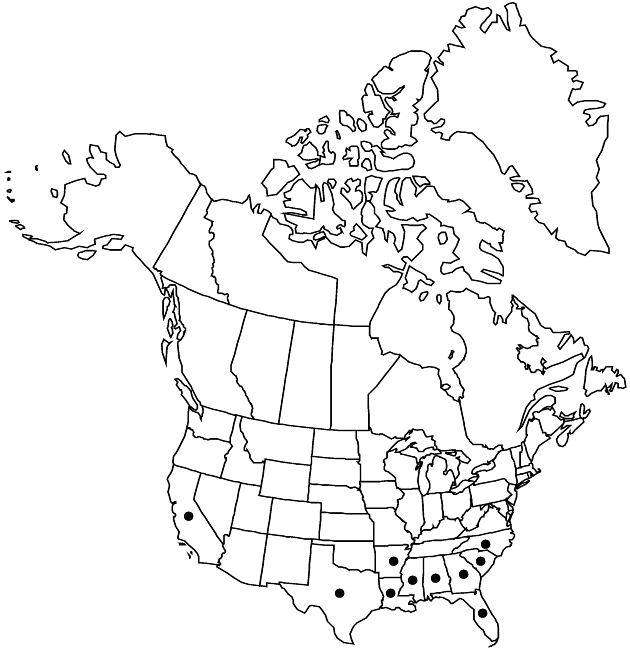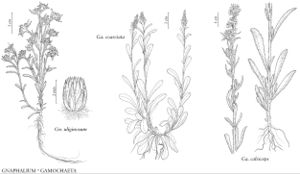Difference between revisions of "Gamochaeta coarctata"
Lejeunia 120: 104. 1987.
FNA>Volume Importer |
FNA>Volume Importer |
Revision as of 18:38, 24 September 2019
Winter annuals or biennials, 15–35(–50) cm; fibrous-rooted. Stems decumbent-ascending, white-pannose (tomentum usually sheath-like). Leaves basal and cauline, basal present (in rosettes) at flowering, blades spatulate to oblanceolate-obovate, (1.5–)3–8(–12) cm × 6–15(–22) mm (gradually or little smaller distally, slightly succulent, margins often crenulate on drying), faces bicolor, abaxial closely white-pannose, adaxial glabrous or glabrate. Heads initially usually in dense, continuous spiciform arrays 2–20 cm × 10–14 mm (pressed), later branched, interrupted. Involucres cylindro-campanulate, 2.5–3 mm, bases glabrous. Phyllaries in 4–5 series, outer (purplish or rosy) elliptic-obovate to broadly ovate-elliptic, lengths 1/3–1/4 inner, apices rounded to obtuse, inner oblong, laminae brown-hyaline, apices rounded to obtuse or blunt, apiculate. Florets: bisexual 2–3; all corollas usually purplish distally. Cypselae (tan) 0.5–0.6 mm. 2n = 28, 40.
Phenology: Flowering Apr–Jun.
Habitat: Ditches, low roadsides, sidewalk cracks, shaded spots around buildings, other shaded, moist habitats
Elevation: 0–150 m
Distribution

Ala., Ark., Calif., Fla., Ga., La., Miss., N.C., S.C., Tex., Va., South America, also introduced in Mexico, West Indies, Europe, Asia, Pacific Islands (New Zealand), Australia.
Discussion
Gamochaeta coarctata is native to South America and is also introduced in Mexico. R. K. Godfrey (1958) identified specimens of G. coarctata as Gnaphalium spicatum Lamarck. Some specimens from the flora area were misidentified by G. L. Nesom (1990f) as Gamochaeta americana (Miller) Weddell, which was described from Jamaica; it is widespread in Central America and Mexico, and has not been observed in the flora area.
Selected References
None.
